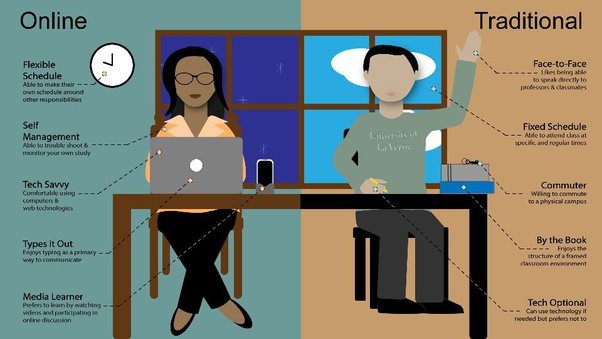Online classes or online study programs have been raised in numbers in the last ten years. The number of students taking the cost-effective online programs getting in hire numbers.
Presently, due to the pandemic, many schools and colleges are climbing up their online course contributions. Also, as we approach another academic year, many students – both existing and new – might be thinking about “Which class structure is best for me?”
Every student comes across the web and online classes, they have numerous choices and wish to do something new in their life. Online classes have a variety of options and that’s why they have advantages and disadvantages

As indicated by an ongoing exploration, over 75 percent of students feel that online training is equivalent or better than classroom learning.
There are numerous advantages of taking classes on the web. Online projects make an advanced education system for some students – especially the individuals who are working all day, who have family commitments, and additionally who live a long way from the schools and colleges. Online classes additionally give students more self-governance over their learning and permit them to work at an individualized speed.
Notwithstanding, are online classes appropriate for everybody? Today, around 1 in every 4 students, asserts that they learn better through online classes. This implies that 3 out of 4 students actually feel they perform better in a conventional classroom education.
When weighing on the web classes versus customary classes, it is generally critical to consider your own special learning style and booking needs.
1. Online courses offer students more noteworthy command over their own learning by empowering them to work at their own speed.
2. Additional connecting with mixed media content, more prominent admittance to their students by means of online visitors, and less probability of outside planning clashes can add to the improved maintenance evaluation.
3. Online courses likewise will in general incorporate more endless evaluations. The more regularly students are surveyed, the better their teachers can follow in advance and mediate when required.
Online Education: From Good to Better to Best?
For some time now, online schooling has been a decent alternative for students who – for different reasons – can’t access on-the-ground training. Also, despite the fact that there are still instances of simple online courses out there, both the innovation and the instructional method controlling internet learning have improved throughout the most recent decade
The following points are the benefits of the Online education system.
1. Class Flexibility
One of the common advantages of online classes is the degree of adaptability you get. You can keep working, running the family unit, and take classes at the same time. While online students get cut off times, there is greater adaptability around their day – they can pick when to consider, total tasks will tune in to talk, and the sky is the limit from there.
2. Self-discipline
As verified above, taking school classes online gives students more freedom and command over their schooling. This, thusly, requires extraordinary self-control and self-inspiration. In an online program, you should have the option to spur yourself to finish required perusing and tasks. You should consider yourself responsible for these undertakings. You should realize how to oversee and control your time. While these abilities are needed in conventional class settings also, your achievement in an online program will be subject to your capacity to self-propel and complete things.
3. Social Interactions
Online learning comes to interaction with many people from the virtual classrooms you can communicate with many people through various social interactions-based websites. You can communicate with people outside your local region.
One misguided judgment around online coursework is that it requires no cooperation. As a general rule, your companions and educators are directly readily available. Online school classes frequently use collective assets, (for example, Blackboard and video conferencing instruments) to support customary correspondences, conversations, and concepts.
Hybrid Online and Traditional Classes: Are they an Option for You?
On the off chance that you are as yet uncertain whether online classes or conventional classes are appropriate for you, you may think about both. (Indeed, this is a choice!) Some better quality organizations, for example, Goodwin, University, offer a mixed or “crossbreed” design for students requiring adaptability. This implies that some school classes are offered nearby, while others can be taken on the web. All classes, regardless of the organization, check towards your degree.
Half breed degree programs permit understudies to outdo the two universes. Online assets are promptly accessible to students, enhancing customary guidance (as opposed to supplanting it). Students can meet educators face to face, team up with peers in class, and still profit from the adaptability of online classes. Furthermore, research shows they work. As revealed in one exploration understudies (at practically all degrees of accomplishment) do similarly as in conventional homerooms.
Hybrid Classes
A hybrid class combines traditional face-to-face learning in the classroom with online learning that students complete outside of the classroom. The work that students complete online complements the information that is covered in the classroom.
